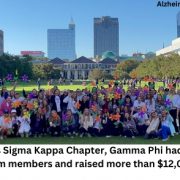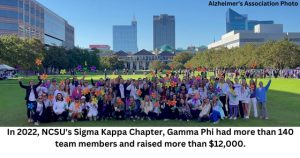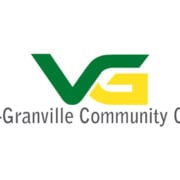Online Workshops In August Designed To Support Caregivers To Those Living With Dementia
Two chapters of the Alzheimer’s Association in North Carolina are partnering with the Parkinson’s Foundation Carolinas to host a series of free virtual weekly education workshops to help those who are providing care for family members or others living with dementia.
The series is titled The Empowered Caregiver and it is designed to help caregivers by sharing activities they can apply to their specific situations.
Dementia is a general term for a decline in mental ability severe enough to interfere with daily life, while Alzheimer’s is a specific disease and the most common cause of dementia. Parkinson’s disease dementia also falls under that umbrella term. While the disease states are different, there are similarities in caring for both forms of dementia.
“Our latest Alzheimer’s Disease Facts and Figures report shows that dementia caregivers in North Carolina face significant emotional, physical and health-related challenges as a result of caregiving,” said Christine John-Fuller, executive director of the Alzheimer’s Association – Eastern North Carolina Chapter. “Dementia is also common for individuals in later stage Parkinson’s. Our goal with this collaboration with the Parkinson’s Foundation is to offer tools and education to help caregivers feel supported and see pathways forward.”
The Empowered Caregiver education series will be offered via live webinar each Thursday in August from 6 p.m. to 7 p.m. -with each week covering a new topic.
Building Foundations of Caregiving – August 1
Explores the role of caregiver and changes they may experience building a support team and managing stress.
Supporting Independence – August 8
Focuses on helping the person living with dementia take part in daily activities, providing the right amount of support and balancing safety and independence while managing expectations.
Communicating Effective – August 15
Teaches how dementia affects communication, including tips for communicating well with family, friends and health care professionals.
Responding to Dementia-Related Behaviors – August 22
Details common behavior changes and how they’re a form of communication, non-medical approaches to behaviors and recognizing when help is needed.
Exploring Care and Support Services – August 29
Examines how best to prepare for future care decisions and changes, including respite care, residential care and end of life care.
“We are excited about this partnership with the Alzheimer’s Association because no matter the disease, care partners need help,” says Diana Parrish, senior advancement director, Carolinas Chapter of the Parkinson’s Foundation. “As a care partner for 19 years, we have found that the Parkinson’s Foundation’s resources, services, and programs have helped us on this journey!”
There is no charge to participate, but registration is required in order to receive the Zoom link for the series. To sign-up, visit tinyurl.com/CaregiverAugust or call 800.272.3900.





